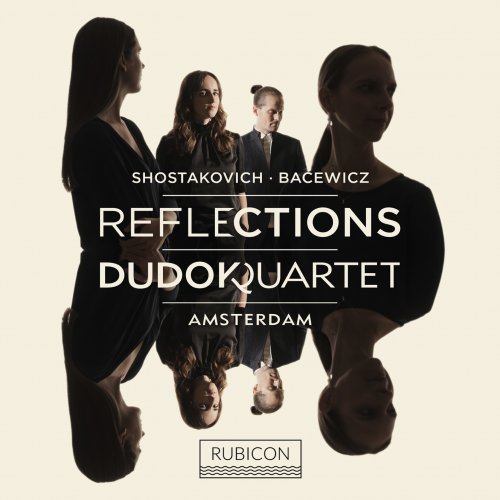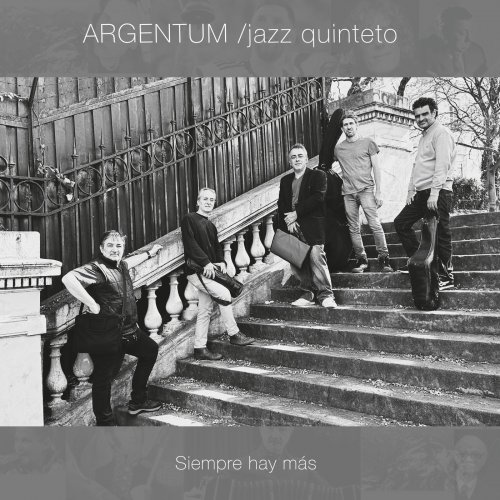Dudok Quartet Amsterdam - Reflections Dudok Quartet Amsterdam (2022) [Hi-Res]

Artist: Dudok Quartet Amsterdam
Title: Reflections Dudok Quartet Amsterdam
Year Of Release: 2022
Label: Rubicon Classics
Genre: Classical
Quality: FLAC (tracks) / 24bit-96kHz FLAC (tracks+booklet)
Total Time: 61:01
Total Size: 284 MB / 1.04 GB
WebSite: Album Preview
Tracklist:Title: Reflections Dudok Quartet Amsterdam
Year Of Release: 2022
Label: Rubicon Classics
Genre: Classical
Quality: FLAC (tracks) / 24bit-96kHz FLAC (tracks+booklet)
Total Time: 61:01
Total Size: 284 MB / 1.04 GB
WebSite: Album Preview
1. Shostakovich: String Quartet No. 5 in B-Flat, Op. 92: I. Allegro non troppo (11:34)
2. Shostakovich: String Quartet No. 5 in B-Flat, Op. 92: II. Andante - Andantino (9:10)
3. Shostakovich: String Quartet No. 5 in B-Flat, Op. 92: III. Moderato - Allegretto - Andante (10:31)
4. Shostakovich: 24 Preludes, Op. 34: No. 10 in C-Sharp Minor (1:46)
5. Shostakovich: 24 Preludes, Op. 34: No. 15 in D-Flat Major (0:57)
6. Shostakovich: 24 Preludes, Op. 34: No. 14 in F-Sharp Minor (2:08)
7. Shostakovich: 24 Preludes, Op. 34: No. 5 in D Major (0:38)
8. Shostakovich: 24 Preludes, Op. 34: No. 16 in B-Flat Minor (1:07)
9. Shostakovich: 24 Preludes, Op. 34: No. 24 in D Minor (1:18)
10. Shostakovich: 24 Preludes, Op. 34: No. 17 in A-Flat Major (2:02)
11. Grayna: String Quartet No. 4: I. Andante - Allegro moderato - Allegro energico (8:51)
12. Grayna: String Quartet No. 4: II. Andante (4:53)
13. Grayna: String Quartet No. 4: III. (6:12)
In a challenging and thought-provoking new album the Dudok’s couple two composers who famously masked their true feelings in their music. Shostakovich’s famous ambiguities are present in his 5th Quartet of 1951, composed at the same time as the 1st Violin Concerto and the 10th Symphony.
Bacewicz’s 4th Quartet written shortly after the oppression of the Poles in the late 1940s by the Soviet regime, is full of folk music influences (Bacewicz had a keen interest in traditional music which spared her from any aggravation from the Polish puppet regime), and was therefore "acceptable" to the authorities. But she also erects a hall of mirrors around the work to mask her true emotions. Is this happy music? Is it masking something darker? That the composer was a fine violinist is clearly apparent in the 4th Quartet which did much to establish her reputation.
Bacewicz’s 4th Quartet written shortly after the oppression of the Poles in the late 1940s by the Soviet regime, is full of folk music influences (Bacewicz had a keen interest in traditional music which spared her from any aggravation from the Polish puppet regime), and was therefore "acceptable" to the authorities. But she also erects a hall of mirrors around the work to mask her true emotions. Is this happy music? Is it masking something darker? That the composer was a fine violinist is clearly apparent in the 4th Quartet which did much to establish her reputation.
![The Mood Mosaic - The Sexploitation (Pulp Grooves From The Mondo Porno Vault) (2025) [Hi-Res] The Mood Mosaic - The Sexploitation (Pulp Grooves From The Mondo Porno Vault) (2025) [Hi-Res]](https://www.dibpic.com/uploads/posts/2025-12/1766131648_uhod8d4qn4msi_600.jpg)

![Tomasz Stańko - Piece for Diana and Other Ballads (Polish Radio Sessions vol. 1/6) (2025) [Hi-Res] Tomasz Stańko - Piece for Diana and Other Ballads (Polish Radio Sessions vol. 1/6) (2025) [Hi-Res]](https://www.dibpic.com/uploads/posts/2025-12/1765788761_cover.jpg)
![Sibel Köse Septet - In Good Company (2025) [Hi-Res] Sibel Köse Septet - In Good Company (2025) [Hi-Res]](https://www.dibpic.com/uploads/posts/2025-12/1765846644_uizwujac4ht2d_600.jpg)
![Club Bolero, Armik - A Day in Brazil (2007) [Hi-Res] Club Bolero, Armik - A Day in Brazil (2007) [Hi-Res]](https://img.israbox.com/img/2025-12/15/5l607nskcv4xb0n237d8ngs7q.jpg)
![Tomasz Stańko - Rue de la Tour (Polish Radio Sessions vol. 5/6) (2025) [Hi-Res] Tomasz Stańko - Rue de la Tour (Polish Radio Sessions vol. 5/6) (2025) [Hi-Res]](https://www.dibpic.com/uploads/posts/2025-12/1765796463_cover.jpg)


![RAS - Rød i Blå (2025) [Hi-Res] RAS - Rød i Blå (2025) [Hi-Res]](https://www.dibpic.com/uploads/posts/2025-12/1765847447_s09xuo23tcu1a_600.jpg)